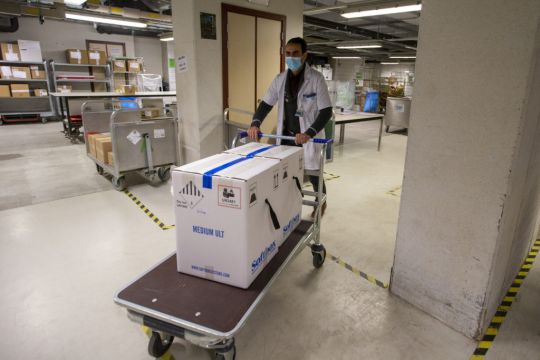The first shipments of coronavirus vaccines have arrived across the European Union as authorities prepare to administer the first jabs to the most vulnerable people in a co-ordinated effort on Sunday.
The vaccines developed by BioNTech and Pfizer arrived by truck in warehouses across the continent on Friday and early on Saturday after being sent from a manufacturing centre in Belgium before Christmas.
The rollout marks a moment of hope for a region that includes some of the world’s earliest and worst-hit virus hot spots, including Italy and Spain, and others, such as the Czech Republic, that were spared the worst early on only to see their healthcare systems near breaking point in the autumn.
Altogether, the 27 EU member states have seen at least 16 million cases of coronavirus and more than 336,000 deaths.

“It’s here, the good news at Christmas,” German health minister Jens Spahn said at a news conference on Saturday.
“At this moment, trucks are under way across Europe, across Germany and its regions, to deliver the first vaccine. More deliveries will follow the day after tomorrow. This vaccine is the decisive key to end this pandemic.”
“It is the key to getting our lives back,” Mr Spahn said.
The rollout is the result of co-ordination on the part of all 27 member states, helping the bloc to also project a sense of unity in a lifesaving mission of logistical complexity after difficulties in negotiating a post-Brexit trade deal with Britain.
The first doses, however, are limited to nearly 10,000 in most countries, with the mass vaccination programmes expected to begin only in January.

Each country is deciding on its own who will get the first jabs – but they are all making the most vulnerable first in line.
French authorities announced this week that it will prioritise the elderly, based on the high impact on older populations in previous virus surges in France.
The French medical safety agency will monitor for eventual problems.
Germany, where the pandemic has cost more than 30,000 lives, will begin with those over 80 and people who take care of vulnerable groups.
Spanish authorities said early on Saturday that the first batch of the coronavirus vaccine to reach the country had arrived in the central city of Guadalajara – where the first jabs will be administered on Sunday morning at a care home.

A nurse in Rome at Spallanzani Hospital, the main infectious diseases facility in Italy’s capital, should be the first in the country to receive the vaccine, followed by other health personnel.
In Poland, the first two people to be vaccinated on Sunday will be a nurse and a doctor at the Interior Ministry hospital in Warsaw, the main coronavirus hospital in the capital, followed by medical personnel in dozens of other hospitals.
Prime minister Mateusz Morawiecki recently called it the patriotic duty of Poles to get vaccinated – a message directed at a society where there is a high degree of vaccine hesitancy born from a general distrust of authorities.
In Bulgaria, where suspicions also run high, the first person to get the jab will be health minister Kostadin Angelov, who has promised an aggressive campaign will start soon to promote the benefits of the jabs.
In Croatia, where the first batch of 9,750 vaccines arrived early on Saturday, a care home resident in Zagreb, the capital, will be the first to receive the vaccine on Sunday morning, according to state HRT TV.
HRT TV also reported that authorities would launch a pro-vaccination campaign that will include celebrities and other public figures who will get the vaccine on camera.
“We have been waiting for this for a year now,” Romanian prime minister Florin Catu said after the first batch of the vaccine arrived at a military-run storage facility there.

The vaccinations begin as the first cases of a new variant of the virus that has been spreading in the UK have now been detected in France and Spain.
The new variant has caused several European countries to restrict traffic with Britain.
A French man living in England arrived in France on December 19 and tested positive for the new variant on Friday, the French public health agency said in a statement.
He has no symptoms and is isolating at his home in the central city of Tours.
Meanwhile, health authorities in the Madrid region said they had confirmed the variant in four people, all of whom are in good health.
Regional health chief Enrique Ruiz Escudero said the new strain had arrived when an infected person flew into Madrid’s airport.
German pharmaceutical company BioNTech is confident that its coronavirus vaccine works against the new UK variant, but further studies are needed to be completely certain.







